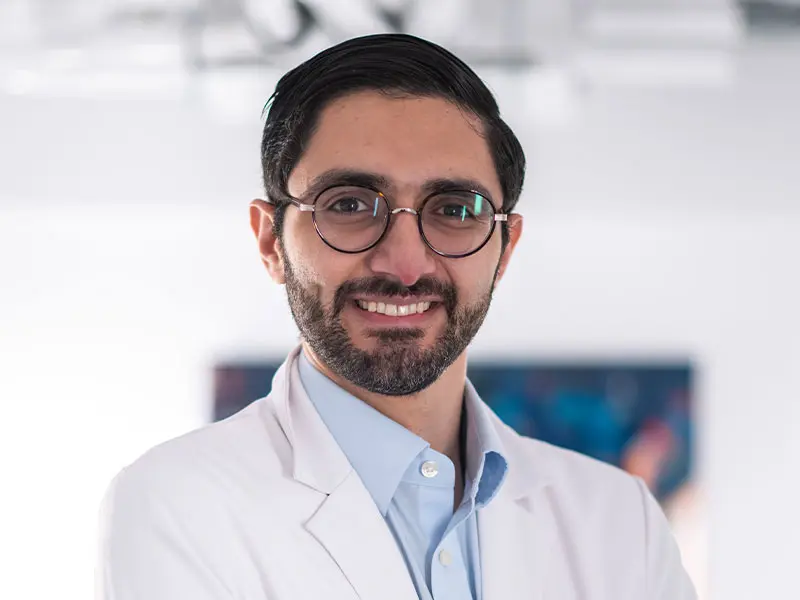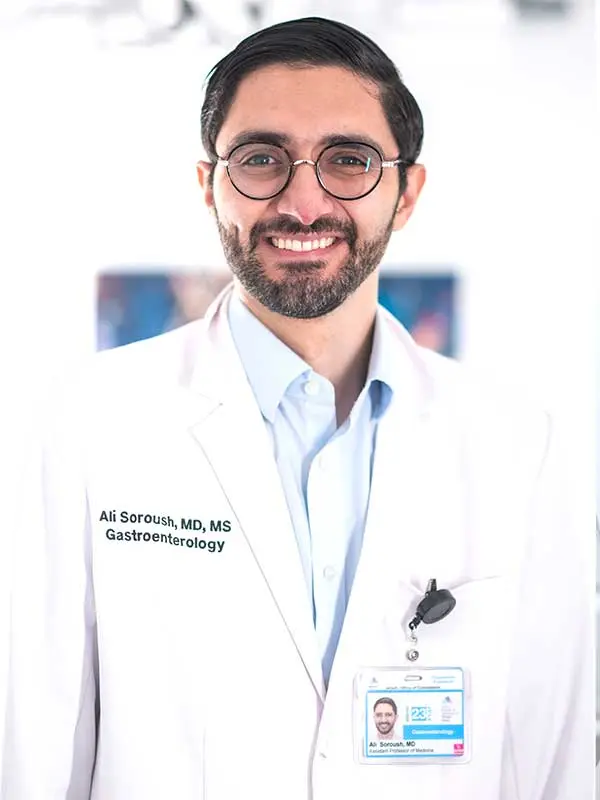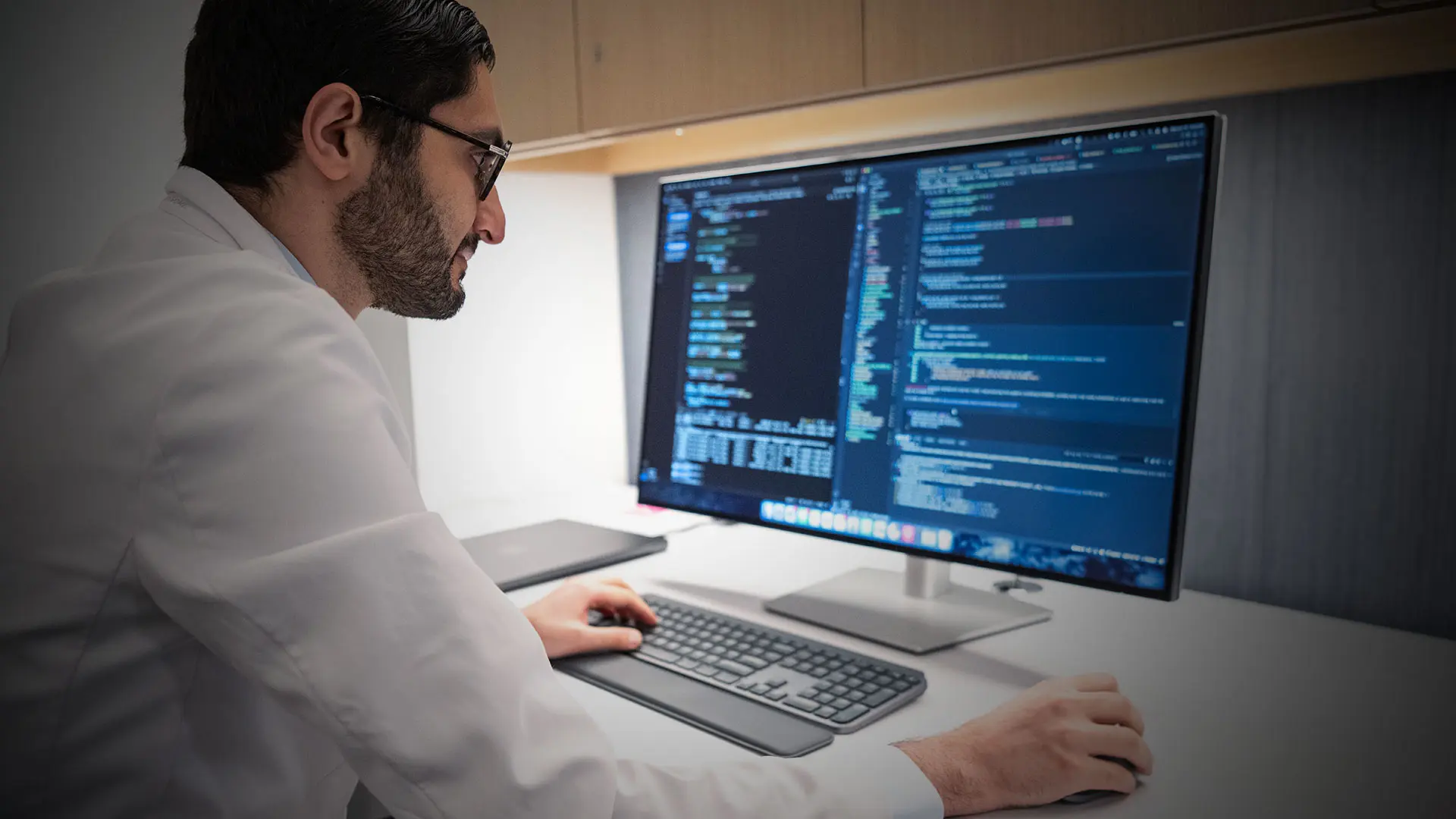In 5 to 10 years, artificial intelligence (AI) may completely transform medicine. Ali Soroush, MD, is providing gastroenterology with a vivid snapshot of what’s possible now through streamlining the flow and use of information to the benefit of patients, clinicians, and researchers.
In a specialty where very large datasets, algorithms, and chatbots are just starting to make their presence known, Dr. Soroush, Assistant Professor of Medicine (Gastroenterology, and Data-Driven and Digital Medicine) at the Icahn School of Medicine at Mount Sinai, is working diligently to improve AI literacy and innovation among his colleagues in both clinical and research realms. That mission extends beyond Mount Sinai to professional gastroenterology societies where he is helping to organize and lead broad educational and mentorship campaigns, particularly for trainees and early-career gastroenterologists.
Unlocking Clinical Data From EHRs Through Generative AI
“If we can use generative AI to automate the extraction and organization of data from clinical text buried in the electronic health record (EHR), we could transform patient care and reduce clinician burnout,” explains Dr. Soroush. “My team is developing tools that can interpret unstructured clinical notes, extract relevant GI-specific information, and structure it for multiple downstream applications."
Beginning with his fellowship training five years ago, Dr. Soroush has been laser-focused on maximizing the impact of big data on GI medicine. While serving as chief gastroenterology fellow at Columbia University Irving Medical Center in New York City, he migrated static legacy workflows to live cloud-based platforms and leveraged the EHR system to standardize and automate his co-fellows’ clinical workflows. At the same time, he earned an MS in patient-oriented research and was awarded a separate fellowship to pursue supplementary research training in AI, data science, and biomedical informatics. In 2022, he was named an American Gastroenterological Association Innovation Fellow.
The opportunities for Dr. Soroush to apply his advanced cross-disciplinary training to gastroenterology increased exponentially after he joined the Dr. Henry D. Janowitz Division of Gastroenterology and the Division of Data-Driven and Digital Medicine at Mount Sinai in June 2023. He has pioneered the application of emerging AI technologies to personalize GI cancer screening, moving beyond traditional risk stratification approaches. He aims to both develop generative AI methods to extract and structure clinical data stored in text form in the EHR at scale, and to leverage novel machine learning strategies for improved GI cancer risk assessments. Dr. Soroush presented the first cumulative risk model for upper gastrointestinal cancer at the American Gastroenterological Association’s Digestive Disease Week in May 2025, highlighting how big data can unlock new risk assessment strategies.
“I find the current generation of AI to be most useful for organizing information, and that could make a big difference in colon cancer screening, for example, where the electronic health record poorly captures the recommended date of follow-up colonoscopy due to workflow inefficiencies,” explains Dr. Soroush, who maintains an active gastroenterology practice. “If this information could be automatically extracted, integrated with existing guidelines, and populated into existing EHR-based workflows, it could help ensure patients get their follow-up care on time without physician chart review. Similar processes could help generate patient summaries, clinical risk factors, and quality metrics to expedite routine administrative or clinical decisions. These tasks have fairly straightforward technical solutions, but they first need someone to put it together.”
Dr. Soroush has welcomed that job. Specifically, he has developed (and has a patent pending for) a system that employs generative AI natural language processing to transform screening colonoscopies’ datastreams into standardized, actionable forms.

Dr. Soroush focuses on helping gastroenterologists understand the practical applications of artificial intelligence that address real-world challenges they face, including enhancing patient communication, streamlining documentation, and augmenting clinical decision support.
Education and Mentorship: Developing AI-Empowered Gastroenterologists
"Generative AI represents both an opportunity and a challenge for gastroenterologists who are often overwhelmed by clinical demands and have limited bandwidth to develop new technical skills," says Dr. Soroush, whose postdoctoral studies at Columbia leaned heavily on data science and artificial intelligence. Dr. Soroush has established himself as a thought leader in this nascent field of gastroenterology by developing educational frameworks to help gastroenterologists understand and apply generative AI tools responsibly in their clinical workflows and research programs. His educational sessions focus on understanding the practical applications that address real-world challenges faced by GI specialists, including enhancing patient communication, streamlining documentation, and augmenting clinical decision support.
This educational mission extends to national training and mentorship programs, where Dr. Soroush has assumed the high-profile position of inaugural co-director of the AI Scholars Program for the American Society for Gastrointestinal Endoscopy. In this role, he designed the program's first curriculum that bridges the gap between clinical gastroenterology and cutting-edge AI concepts through hands-on projects and personalized mentorship. He also oversees the professional development each year of 10 gastroenterology fellows who have shown an interest in AI leadership. Over the course of 12 months, these scholars learn AI fundamentals, how to integrate AI into their careers and keep up with a rapidly evolving field, and how to engage with industry and technical partners. The first cohort presented its projects at Digestive Disease Week 2025, showcasing efforts to automate clinical guideline generation, create a medical lecture chatbot, and develop an open-source AI model for colon polyp detection.
At Mount Sinai, he organized the first AI core curriculum for GI fellowship, serving as a model for other training programs. He also mentors medical students, residents, and clinical fellows, guiding their professional growth in both clinical and research domains.
“I constantly challenge them to think about how we can build and integrate the newest data-driven technologies to navigate our field in totally new and innovative ways,” he asserts. “Hopefully, I’m providing them with a little bit of spark and motivation to send them down that pathway.”
Featured

Ali Soroush, MD
Assistant Professor of Medicine (Gastroenterology, and Data-Driven and Digital Medicine)
